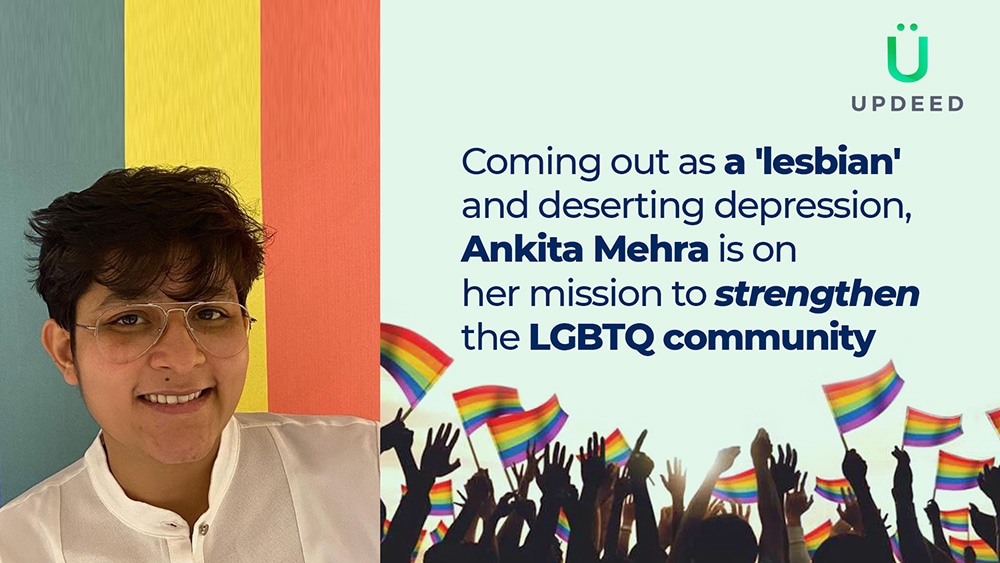Coming out as a ‘lesbian’ and deserting depression, Ankita Mehra is on her way to strengthening the LGBTQ community
“Try out with a boy; you will feel better and become normal,” said a therapist to Ankita, who came out as a ‘lesbian’ after living a restrictive life for 18 years, concealing her sexuality and keeping it to herself.
Today, Ankita Mehra conducts LGBTQ+ awareness sessions, is recognised as one of the top LinkedIn voices and works as the Program Manager of Employer branding, Diversity and Inclusion at Xperi Corporation.

“After restricting myself for years, I accepted my sexuality at the age of 19 while I had my first job. I came out as a ‘lesbian’ to my friends and siblings first, and their mixed reactions forced me to delay conveying it to my parents,” said Ankita Mehra while talking to the team UPDEED.
“I wrote a 16-page letter to my father to come out to him as a ‘lesbian’ and share my experiences and struggle I have gone through. He accepted me. It was new for him. However, the only thing that matters to him is his love for his daughter,” Mehra added.
“My mother took four years to understand and accept,” Mehra said.
Soon after, the family had to go through a difficult phase as a lot of people started passing comments. As per Mehra, this difficult phase paved the way for a strong bonding among the family.
However, the road is not as smooth as it seems.
The phase of bullying and depression
Ankita accepted her sexuality and shared it with her friends; things turned ugly from there.
“My friends backstabbed me. I was a topper in college and had a good reputation. My friends were sharing my sexuality with others in the college without my consent,” Mehra added.
The girl who was admired for being a good student suddenly became a topic of discussion, and people started looking at Ankita with judgemental eyes. People in the college rarely have any knowledge about the community.
“I got scared, started feeling anxious, and went into depression. I was missing my sister, who always landed a supporting hand for me, but I lost my connection as she had to move to Bangalore for her job,” said Mehra.
Ankita started looking for help from therapists. It takes a lot of courage and guts to share inner feelings. However, one of the therapists turned out to be homophobic, made her feel bad, and even suggested trying out with boys to change her mind. Fortunately, she was lucky enough to get a different therapist who helped her, and it took a month for Ankita to come out of depression and anxiety.
Hence, the time is ripe for building an inclusive society, but the question is how?
Towards an inclusive society
Speaking about inclusivity, Ankita completely stands against the general notion that it’s the choice of the community to accept sexuality on their own.
“It’s not a choice; we are born like this,” said Mehra.
Firstly, the mentality that we have adapted due to the presence of a certain friend circle, or it’s some sort of trend of the modern culture, needs to be changed. Even Indian history has a place for the LGBTQ community, she further added. Also, being from the LGBTQ community is considered a religious sin and even unnatural.
“Our love is as pure as yours; our struggles are as real as yours. We also want to get married, adopt, have insurance, and buy houses together, and we also want to invite both families to our weddings,” said Mehra.
Our society is far from acknowledging these basic rights of the community. As Mehra rightly mentioned, people are sitting behind closed doors and don’t bother to understand.
“Post-2018 judgement by SC in September section 377, we have seen the influx of initiatives to educate people, saw corporates opening doors, insurance companies coming out with a plan for queer couples, and more. We’re in a progressive state, and something is happening rather than nothing,” said Mehra.
The year 2018 saw the landmark Delhi High Court decision decriminalising homosexuality being upheld by the Supreme Court. Section 377 of the Indian Penal Code was amended by a five-judge panel led by Chief Justice Dipak Misra to exclude all forms of adult consenting sexual behaviour.
Way forward
Over a period of time, the mindset of the people in society is changing, and the level of acceptance has gone higher, said Mehra. Still, there is a long way to go.
First, we need to unlearn many things before jumping to the learning phase, added Mehra. For Mehra,
- Inclusion starts at home. Individuals need to research, educate themselves and spread the word among the group of people
- People need to stop making queer jokes, which in turn would help stop the phobia at the very beginning
- Taking voluntary efforts will help change the scenario
- People can take part in Pride Parade for sensitisation
The LGBTQ community always remains at the receiving end of hate, violence, abuse, and more. However, according to Mehra, people need to remember that such a negative attitude towards us further strengthens our will to fight for our cause and makes us strong from the inside.
Ready to make a positive impact in the world?
UPDEED is the place for you. Our free and open platform is filled with inspiring stories from individuals and organizations who are making a difference in their communities and beyond. Connect and collaborate with like-minded individuals from around the globe on UPDEED, and discover your own potential to create meaningful change. Join our community and make a difference.





